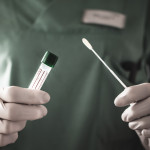An early look at a study of the human papillomavirus (HPV) vaccine Gardasil in men and boys found fewer infections with cancer-causing strains of HPV among those receiving the vaccine compared with placebo, according to an announcement by Merck and a report by UCSF Today.
Gardasil is currently approved in the United States to prevent HPV infection in girls and young women. It is hoped that the vaccine will reduce the number of cases of cervical cancer in women. HPV can also lead to penile and anal cancer, so researchers have been studying the vaccine in boys and men.
The study reported by Merck has enrolled 4,065 men and boys between the ages of 16 and 26. After an average of 29 months of follow-up post vaccination, only 15 of the men and boys had persistent infection with HPV lasting six months or more. This compared with 101 cases of persistent infection in the group who received a placebo. While there were only three cases of genital warts—also caused by HPV—in the Gardasil group, there were 31 cases in the placebo group.
Though penile cancer is rare, anal cancer is much more common in men who have sex with men (MSM). Joel Palefsky, MD, a professor at the University of California in San Francisco and a researcher involved in the study, commented that rates of anal cancer in MSM may be 10 times higher than cervical cancer in women. Merck says they will submit data on Gardasil in men and boys to the U.S. Food and Drug Administration (FDA) before the end of the year.
“To me, the data suggest very strongly that the vaccine will work in men,” Palefsky said. “Policymakers will have to analyze cost-benefit data to tell us who should be vaccinated.”
Advertisement
Advertisement
Advertisement






2 Comments
2 Comments